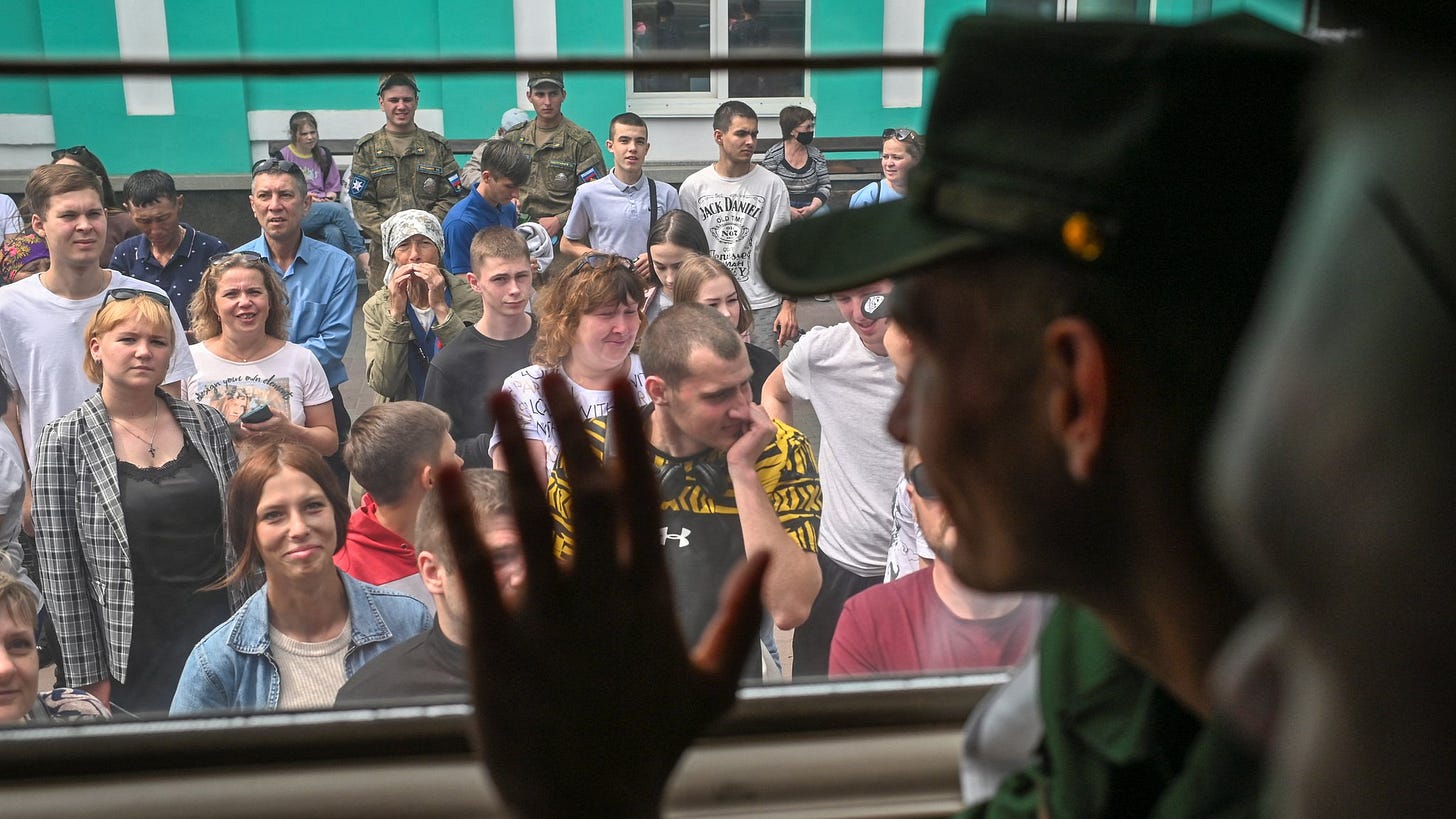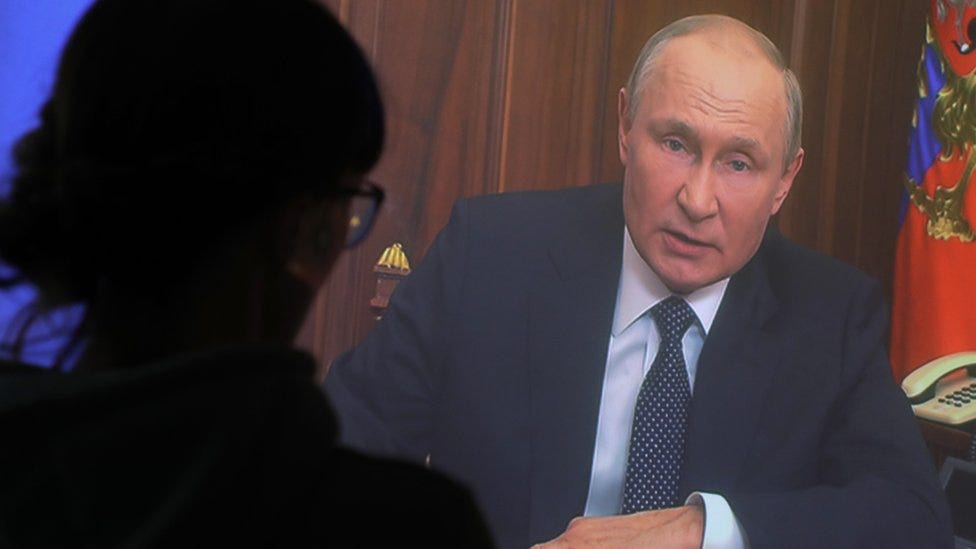‘Everything has changed’: Russians question future amid mobilisation
Many Russians now consider fleeing abroad, rather than being called up to the military. But it is unclear what the criteria for partial mobilisation are and whether national borders will be closed.
By Amaliya Zatari, Masha Kiseleva, Anastasia Golubeva and Rhodri Davies
**Some names in the article have been changed to protect identities

A Russian military reservist, Alexander was travelling with three friends, in their twenties and thirties, to Georgia.
They were planning to see other friends who'd already fled Russia after it's invasion of Ukraine.
The four travelled by car on Wednesday morning through the Caucasus Mountains.
Then President Putin announced a partial mobilisation of reservists for the war.
He feared being called up for military service.
Alexander is a vehicle repairman, which, while not a top priority for being called up, could make him a target.
Worry at the border
They arrived at the Verkhny Lars border crossing. There were no signs of others fleeing the country.
"At the Russian border, there was no queue at all. At the Georgian one - just a small queue," Alexander, 35, said.
But he had no idea if the announcement meant they'd be barred from leaving Russia.
"We were worried about how we would pass the border," he said.
"We prepared photos of military ID cards, but no one asked anything. They asked the usual questions - our plans in Georgia and so on. There were no problems."
By midday, the friends crossed over.
They had planned to return to Russia, but now aren't sure.
"Today everything has changed," Alexander said, "and we are looking into different options".
In a rare national address, President Putin had said the partial mobilisation was to ensure territorial integrity and protect people in Russian-occupied territories of Ukraine.
Defence Minister Sergei Shoigu then said 300,000 people with combat experience will be called up to fight.
The measures began the same day.
Many heads of Russian regions said they have begun work on partial mobilisation.
Social media lit up with questions over whether people would be allowed to leave the country. Groups on the platform Telegram shared information about travelling to neighbouring countries. Reports circulated of flights from Moscow to Dubai costing five times the average Russian monthly wage.
Like Alexander, for Valery and her husband Sergei, 35 and 33 respectively, the question over what to do came immediately.
They were also on their way to Georgia, for their honeymoon.
Just past noon, they too crossed the border at Verkhny Lars.
"The guards didn't ask us anything at all," Valery said. "Everything took an hour."
"There were no queues, but I think that situation might change," Valery said.
But as soon as they crossed, they questioned whether they would go back home.
"Nothing is clear anymore", she said.
How will mobilisation work?
It's the first time in modern Russia's history that a mobilisation decree has been made, so there is no precedent to say how it will work.
Instead, people are having to make informed guesses from legislation, President Putin's decree, and Mr Shoigu's statement.
A draft board, alongside a medical board, decides who to call up.
The Defence Ministry has said Russia has a mobilisation base of 25 million people, but that only one percent of that are eligible for this partial mobilisation.
Mr Putin's decree didn't specify whom from the reserve would be prioritised. But he did say in his speech it will be those who have served in the forces and with "certain military specialties and relevant experience".

The law does not specify whether men or women are to be mobilised. But certain occupations - for instance, doctors - should be on the military register and therefore on the reserve list, whether male or female.
There are many reservists who are former service people, maintaining salaries and training.
They are put in categories depending on their age and rank. For instance, colonels up to 60-years-old, and soldiers up to 35-years-old, are in the first category, that's prioritised for call-ups.
But the Duma, Russia's parliament, can raise the age limits if needed, in one day.
Those called up will be paid like any other military service person.
Defence Minister Shoigu promised that students will not be mobilised.
Russia already conscripts men from 18-27-years-old semi-annually. But not all are summoned, with between 200,000-300,000 men being conscripted annually over the past few years. Typically, they serve a year.
Those eligible for conscription will also not be mobilised, as per normal procedure.
It may be possible for Russians to get deferrals - but the process differs from normal conscription, for example, it's not as easy to get a deferral from mobilisation for fitness reasons.
Other reasons for mobilisation deferral include being a local government representative or Duma deputy, being a carer for a disabled relative, or having four or more children.
And with some asking if people would still be able to leave the country to avoid mobilisation, even Kremlin spokesman Dmitry Peskov didn't know.
"I cannot answer this question now," he said.
"There are provisions for this in the current laws … Clarifications will follow."
But according to the law, citizens summoned for mobilisation are prohibited from leaving their homes without military permission.
Social media war
What's already clear is the opposition to the move.
Imprisoned Russian opposition figure Alexei Navalny said the move will lead to "massive tragedy and a massive amount of deaths".
The democratic Vesna movement called protests that were seen from Siberia to St Petersburg and Moscow on Wednesday.

Activists at Helpdesk Media launched a bot to advise people who don't want to go to war. The opposition movement Soft Power started a petition against the mobilisation on change.org.
In a few hours, it had almost 200,000 signatures.
BBC Russian correspondent Anastasia Golubeva said, "the partial mobilisation is happening due to Ukraine's counterattack this month. That pushed Russian forces back from several towns held in Ukraine's east.
"Although Mr Putin is saying the move was due to Russia facing the military power of Nato and Western countries supporting Ukraine."
Ms Golubeva said that immediately after it was made, Russia's regional heads made pronouncements of support for it, with some calling for people to join the forces to "protect Russian sovereignty and people of Donbass".
She added, "many pro-war bloggers also started to blame the mobilisation on the West, saying that it would not happen if Ukraine didn't receive weapons and money from the West."
"But some are worried. Alongside the demonstrations, voices on social media have said they do not want to see their relatives go to war and called for Russian politicians and supporters of the invasion to join the forces instead of regular people.
"Many opposition activists and political experts expressed a fear that a 'partial mobilisation' might mask a total mobilisation, which is now more likely if the Russian troops see another failure in Ukraine."
Read more on this story in Russian here.



